备考2011高效学习方案英语高二册:unit 6 life in the future
文档属性
| 名称 | 备考2011高效学习方案英语高二册:unit 6 life in the future | 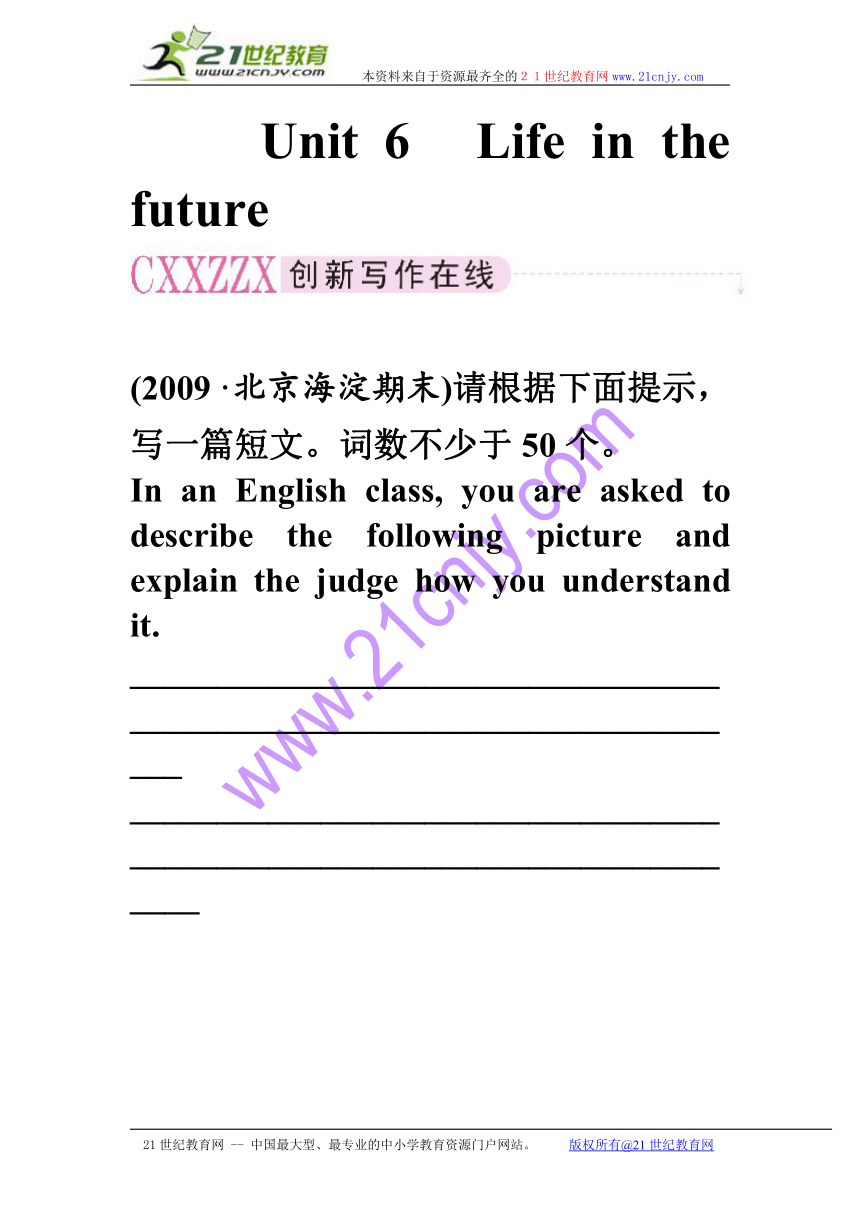 | |
| 格式 | rar | ||
| 文件大小 | 536.5KB | ||
| 资源类型 | 教案 | ||
| 版本资源 | 人教版 | ||
| 科目 | 英语 | ||
| 更新时间 | 2010-12-14 17:12:00 | ||
图片预览

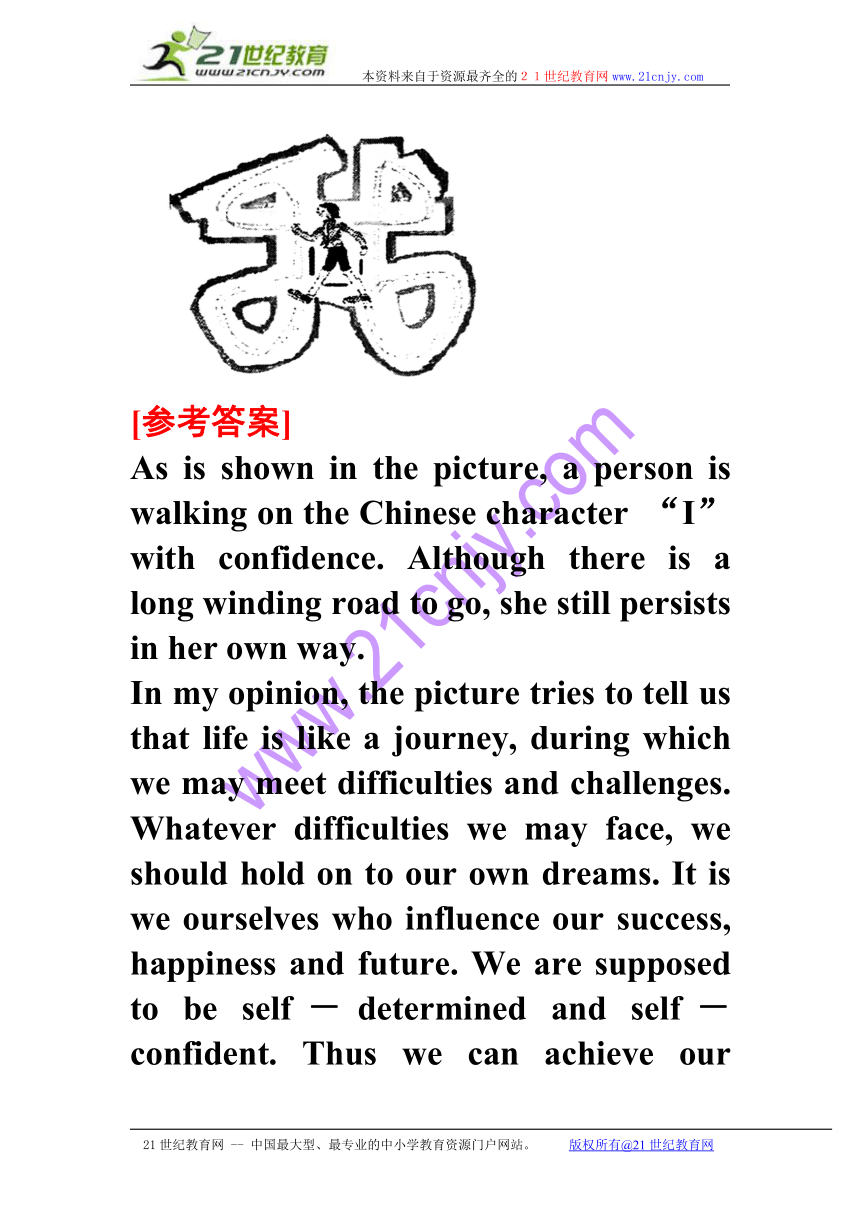
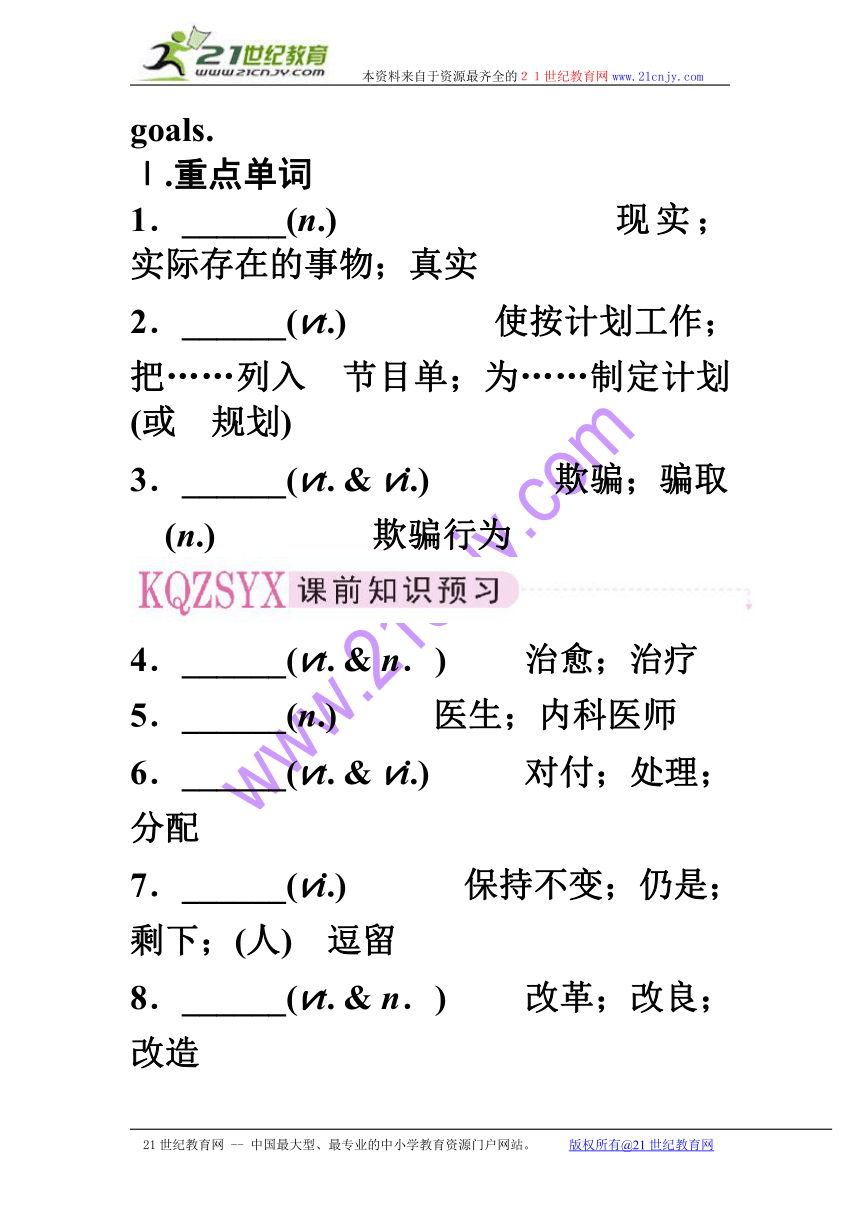
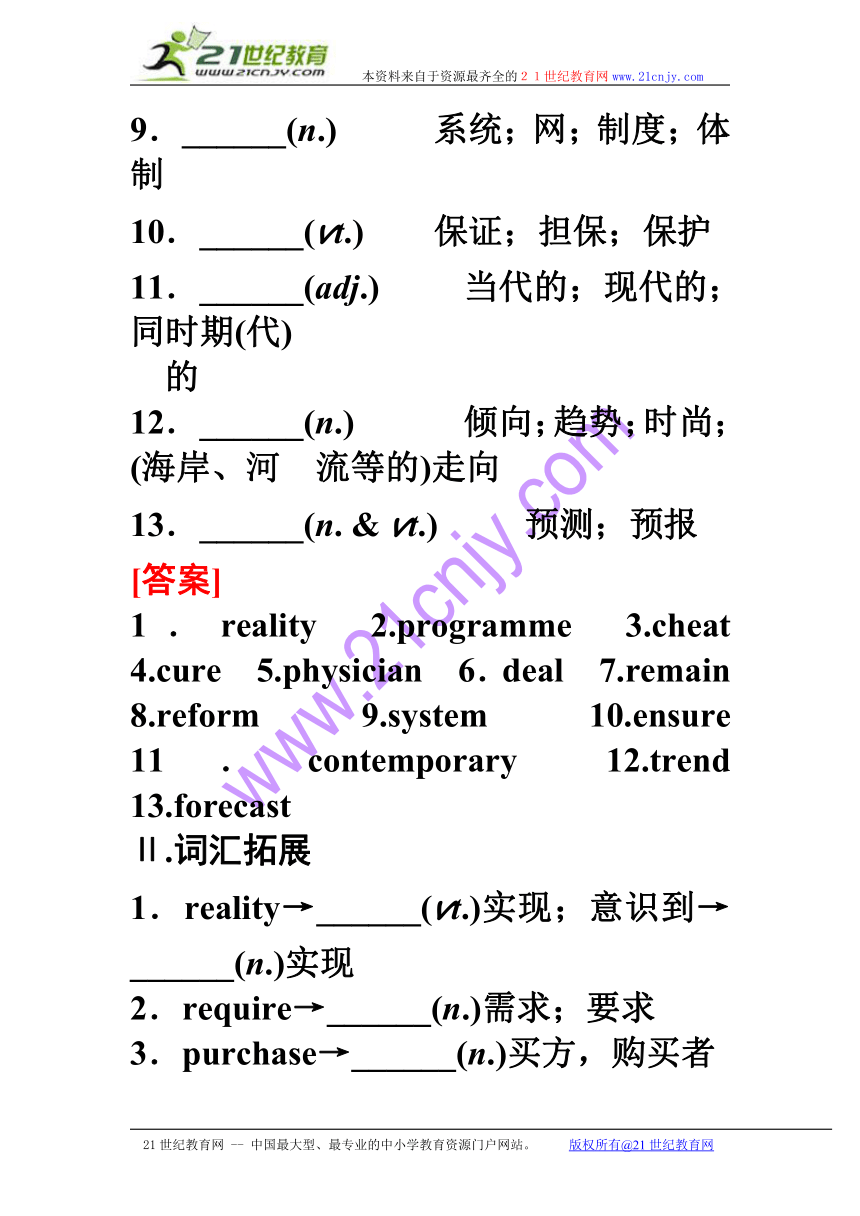
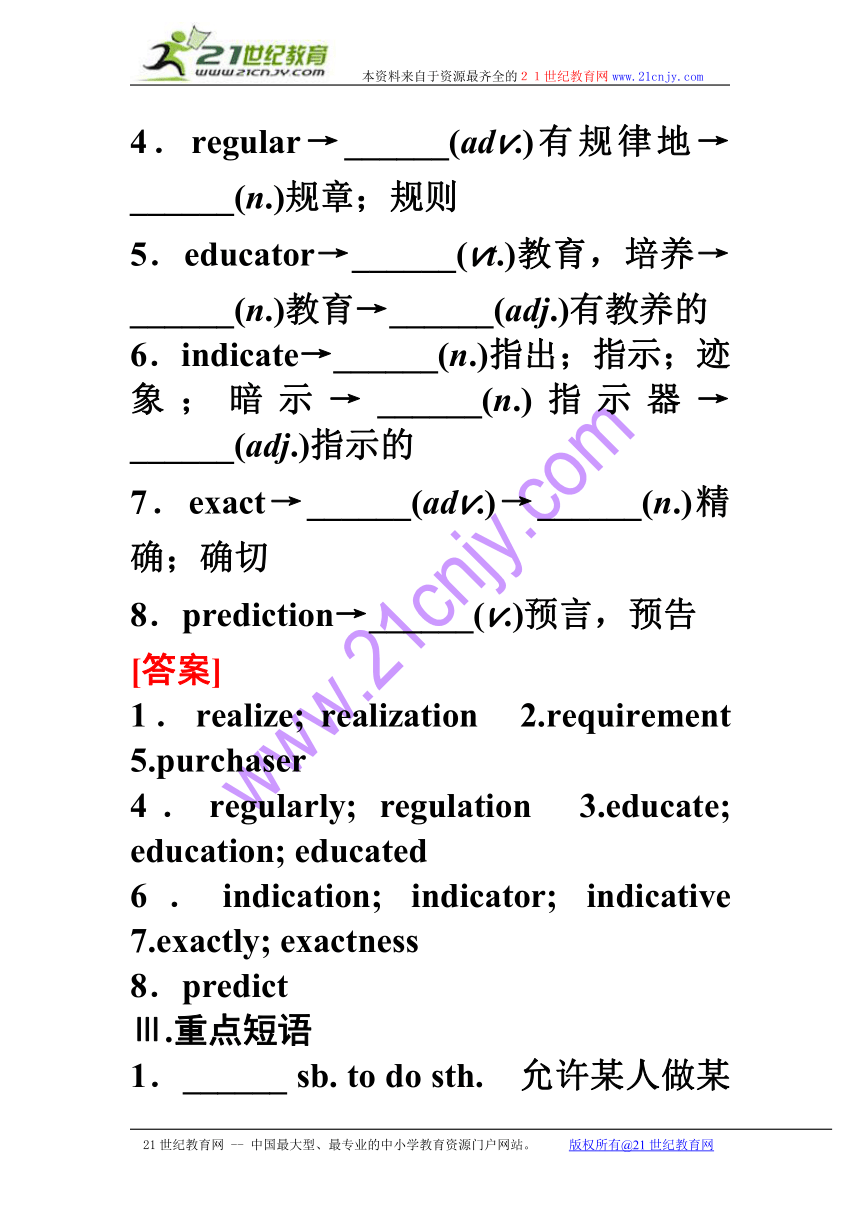
文档简介
本资料来自于资源最齐全的21世纪教育网www.21cnjy.com
Unit 6 Life in the future
(2009·北京海淀期末)请根据下面提示,写一篇短文。词数不少于50个。
In an English class, you are asked to describe the following picture and explain the judge how you understand it.
_______________________________________________________________________
________________________________________________________________________
[参考答案]
As is shown in the picture, a person is walking on the Chinese character “I” with confidence. Although there is a long winding road to go, she still persists in her own way.
In my opinion, the picture tries to tell us that life is like a journey, during which we may meet difficulties and challenges. Whatever difficulties we may face, we should hold on to our own dreams. It is we ourselves who influence our success, happiness and future. We are supposed to be self-determined and self-confident. Thus we can achieve our goals.
Ⅰ.重点单词
1.______(n.) 现实;实际存在的事物;真实
2.______(vt.) 使按计划工作;把……列入 节目单;为……制定计划(或 规划)
3.______(vt. & vi.) 欺骗;骗取
(n.) 欺骗行为
4.______(vt. & n.) 治愈;治疗
5.______(n.) 医生;内科医师
6.______(vt. & vi.) 对付;处理;分配
7.______(vi.) 保持不变;仍是;剩下;(人) 逗留
8.______(vt. & n.) 改革;改良;改造
9.______(n.) 系统;网;制度;体制
10.______(vt.) 保证;担保;保护
11.______(adj.) 当代的;现代的;同时期(代)
的
12.______(n.) 倾向;趋势;时尚;(海岸、河 流等的)走向
13.______(n. & vt.) 预测;预报
[答案]
1.reality 2.programme 3.cheat 4.cure 5.physician 6.deal 7.remain 8.reform 9.system 10.ensure 11.contemporary 12.trend 13.forecast
Ⅱ.词汇拓展
1.reality→______(vt.)实现;意识到→______(n.)实现
2.require→______(n.)需求;要求
3.purchase→______(n.)买方,购买者
4.regular→______(adv.)有规律地→______(n.)规章;规则
5.educator→______(vt.)教育,培养→______(n.)教育→______(adj.)有教养的
6.indicate→______(n.)指出;指示;迹象;暗示→______(n.)指示器→______(adj.)指示的
7.exact→______(adv.)→______(n.)精确;确切
8.prediction→______(v.)预言,预告
[答案]
1.realize; realization 2.requirement 5.purchaser
4.regularly; regulation 3.educate; education; educated
6.indication; indicator; indicative 7.exactly; exactness
8.predict
Ⅲ.重点短语
1.______ sb. to do sth. 允许某人做某事
2.clean ______ 扫打干净;整理;赚钱;获利
3.keep sb. ______ 陪伴某人
4.______ sure 确信;证实
5.deal ______ 安排;处理
6.in ______ 贮藏着;准备着;就要来到
7.be well-prepared ______ 为……作好充分准备的
8.______ to 导致;通向
9.pay ______ to 注意;留意
10.keep in touch ______ 与……保持联系
11.______ usual 照常;像往常一样
12.______ a glimpse of 瞥见
13.make ______ 预测;进行预言
[答案]
1.allow 2.up 3.company 4.make 5.with
6.store 7.for 8.lead 9.attention 10.with
11.as 12.catch 13.predictions
Ⅳ.重点句型
1.The Internet also makes it easier for companies to keep in touch with customers and companies in other countries.
互联网也使得公司可以和客户及国外的公司保持联系更容易。
2.It is certain that things will change.
将来情况肯定会发生变化。
Ⅴ.重点语法
Noun Clause 2(名词性从句2)
Ⅰ.词汇聚焦
1.agreement n. 同意,一致,协议
[思维拓展]
agreement常构成如下短语:
reach an agreement与某人达成协议
=come to an agreement
=arrive at an agreement
=make an agreement
in agreement on/upon/with/about...
在/关于……意见一致;(语法)相一致,呼应
agree常构成的搭配有:
agree with sb.同意某人的意见
agree to a plan/a suggestion/an arrangement
同意一项计划/一条建议/一项安排
agree on sth.商定某事
agree to do sth.同意做某事
[指点迷津]
agree后可跟不定式,但不可跟含有不定式的复合宾语,即sb. to do sth.结构。另外,agree后的介词由其宾语来决定,宾语不同介词不同。
①We are in agreement on that point.
②They are still not in agreement about the plan.
The two sides have finally ______, though some small differences still exist.
A. made a decision B. reached an agreement
C. settled down D. broken up
解析:句意为“尽管还存在小的分歧,双方最终达成了协议”。A“作出决定”,B“达成协议”,C“定居”,D“打破”。
答案:B
2.doubt n. & v. 疑惑,怀疑
[思维拓展]
without doubt毫无疑问地,无疑地
There is no doubt that...……没有疑问。
I doubt if/whether...我怀疑是否……。
I don’t doubt that...我不怀疑……。
[指点迷津]
doubt用作动词,后接从句,主句是肯定的,用if或whether引导,主句是疑问句或否定句的,则用that引导。
名词doubt后接同位语从句,否定句、疑问句用that引导,肯定句用whether引导。
①I doubt whether he’ll be successful.
②I don’t doubt that he’ll be successful.
③Do you doubt that he’ll be successful
④There is no doubt that he’ll be successful.
There is some doubt ______ John will come next week.
A. that B. whether
C. which D. what
解析:空格后从句结构完整,故可排除C、D。主句为肯定句,故应该用whether。
答案:B
3.bear v. 生育,生殖;结(果实);忍受;负担;其过去式、过去分词为:bore, borne/born
[指点迷津]
bear当“忍受”讲时,常与can, could连用,用于否定句、疑问句中,相当于stand,后跟doing作宾语。
①This cloth won’t bear washing.
②I will bear all the expenses.
I can’t bear ______, so I hope you can come on time.
A. to keep waiting B. to keep to wait
C. being kept waiting D. being kept to wait
解析:bear表示“忍受”时,后可跟名词、动名词或不定式作宾语,keep作使役动词使用,后面不跟不定式作宾语补足语。
答案:C
4.require v. 要求,请求,命令
[思维拓展]
require that...(should+)do...
require sth. of sb.要求某人某事
require (of) sb. to do sth.要求某人做某事
require sth.需要……
sth. requires doing/to be done某物需要……
[指点迷津]
need < require <demand
需要 因需要而请求 强烈请求
[注]require后不能直接跟动词不定式作宾语。
①This suggestion will require careful thought.
②To carry out this plan would require increasing our staff by 50%.
His health required that he ______ as early as possible.
A. went to bed B. would go to bed
C. was going to bed D. go to bed
解析:题意为:他的健康要求他尽可能早地上床休息。require后的宾语从句中谓语结构为:“(should+)动词原形”,表示虚拟语气。
答案:D
5.company n. 同伴,伴侣;友谊,交情;陪伴;公司
[思维拓展]
keep/bear pany陪伴某人
fall into company with偶然和……结识
in the company of在……的陪同下
have company有客,招待客人
①He kept me company.
②I had no company on the journey.
—Why are we going to France I can’t speak a word of French.
—Don’t worry, you’re ______. —Neither can I.
A. good company B. in company
C. in good company D. company
解析:be good company表示“有趣的伙伴”;in company表示“客人在场”;in good company表示“处于与另一人同样的境地”。
答案:C
6.spread v. 伸展;展开;传播
[思维拓展]
spread out传开消息
spread rumors散布谣言
spread like wildfire像野火般传开
spread oneself舒展身体
get about/around/round=spread (消息等)传开
①Please spread the table cloth over the table.
②Bird flu has spread all over the world.
③The house caught fire and the fire spread quickly.
With the rapid growth of population, the city ______ in all directions in the past five years.
A. spreads B. has spread
C. spread D. had spread
解析:本题题干中有in the past five years这一时间状语,因此应该用现在完成时。
答案:B
7.ensure vt. 确保,保证,保护
[思维拓展]
ensure+sth.保证某事
ensure+that-clause保证……
ensure+间宾+直宾
ensure success(safety, supplies)
保证成功(安全,供应)
ensure sb. against/from danger保护某人免遭危险
[指点迷津]
ensure相当于make sure,后跟肯定意义的从句;若用于否定句,则应跟表示疑问的连接词连接从句。
①We can ensure that the work shall be done on time.
②To ensure him against/from danger, we’ll take on another bodyguard.
The medicine will ______ you a good night’s sleep.
A. make sure B. ensure
C. be sure D. promise
解析:题意为“这药保证你能睡一夜好觉”。make sure表示“确保”,强调采取行动,后面跟of短语或从句。ensure表示“保证……(事情出现)”,后面跟双宾语。be sure后跟of/about sth.,且主语为人。promise表示“答应”;“许诺”。
答案:B
Ⅱ.短语突破
1.come true实现
[思维拓展]
[指点迷津]
此处come是连系动词,意为“变得,成为”,因此come true不能用于被动语态;realize是及物动词,后面可以接宾语,也可以用被动语态。
To everyone’s joy, her wish to become a soldier ______ at last.
A. realized B. came true
C. carried out D. put into practice
解析:A项需要用被动形式:C项意为“实施”;D项意为“把……付诸实践”;B项意为“实现”。
答案:B
2.in store贮存着;在等待,即将降临到……身上
[思维拓展]
in common with与……有共同之处
in general大体上,通常
in particular (=particularly)特别地,尤其地
in short简言之
in advance预先
in detail详细地
in person亲自
in public公开地
in return作为酬谢
①My furniture is in store while I’m abroad.
②We have a few surprises in store.
③There’s a pleasant surprise in store for you.
④If you’re not careful enough, there will be another accident in store for you sooner or later.
3.keep in touch with与……保持联系
[思维拓展]
be in/out of touch with与……(没)有联系
bring sb. into/in touch with sb.
使某人接触/了解到……
get in touch with与……取得联系
lose touch with与……失去联系
①I still keep in touch with most of my high school classmates.
②I’ll get in touch with you as soon as I arrive.
③We’ve been out of touch with them for ages.
Here’s my card. Let’s keep in ______.
A. touch B. relation
C. connection D. friendship
解析:keep in touch with sb.“与某人保持联系”;B、C、D三项均不能与keep in搭配使用。
答案:A
4.pay attention to注意,留意
[思维拓展]
attract/draw/invite one’s attention吸引某人的注意
bring sth. to one’s attention吸引某人注意某事
devote one’s attention to...专心于……
give one’s attention to...注意……
fix one’s attention on/upon...把注意力集中在……
focus/center one’s attention on...
把注意力集中在……
We should pay more attention to state affairs.
Hearing the sound, the baby fixed his attention ______ the toy car.
A. to B. at
C. by D. on
解析:fix one’s attention on为固定搭配。
答案:D
5.instead of=in place of, rather than代替,而不是
[指点迷津]
instead与instead of
instead of为介词,后跟名词、代词、动名词等名词性的词,指“舍”的方面;
instead为副词,跟句子连用,可放在句首,也可放在句末,指“取”的方面。
①If you can’t go, he’ll go instead of you.
②If you don’t want to do it, I’ll do instead.
—______ is it to be on duty
—Lucy is ill, so I take her turn ______.
A. Who; instead
B. Whose turn; instead
C. Who; instead of
D. Whose turn; instead of
解析:it is one’s turn to do sth.“轮到某人做某事”,其特殊疑问句为:Whose turn is it to do sth.?由Lucy is ill可知,“我代替她”,是表示要做的动作,用instead。
答案:B
6.at a speed of以……的速度
[思维拓展]
with great speed以极快的速度
at full/top speed以全速
at high/low speed以高速/低速
put on speed加速
at a price of...以……的价格
at a length/depth/width of...
以……的长度/高度/宽度
The other day, my brother drove his car down the street at ______ I thought was a dangerous speed.
A. as B. which
C. what D. that
解析:该句中缺少was的主语;若用B则B与at构成“介词+关系代词”结构,在句中作定语使用,不合句意。
答案:C
7.happen to sb.发生在某人身上
What happened to you?你怎么了?
[思维拓展]
happen to sb./sth.发生在某人/某物身上
happen to do sth.碰巧,恰好做某事
happen to be doing碰巧正在做……
happen to have done碰巧已经做……
It (so) happens that...(如此)碰巧,恰好
[指点迷津]
happen是不及物动词,没有被动形式。
—We haven’t heard from Jane for a long time.
—What do you suppose ______ to her
A. was happening B. to happen
C. has happened D. having happened
解析:分析题干可知,do you suppose是插入语,空格处应为谓语形式,由此排除B、D,又从题意可知,此处表示她发生了什么事,应用完成时态。
答案:C
I don’t know whether you happen ______, but I’m going to study in the U.S.A. this September.
A. to be heard B. to be hearing
C. to hear D. to have heard
解析:本句考查happen to后的动词时态,由题意知此处表示已发生的情况,故用完成时。
答案:D
Ⅲ.句型归纳
1.People in the future will be able to enjoy a longer and healthier life and remain active even in old age.未来的人将能够更长寿,更健康,即使年龄很大,也会很活跃。
remain active为系表结构,remain在此处是系动词,意为“保持,依然,仍然,继续”。另外,remain也是一个不及物动词,意为“留下,剩下,残存”。
[注]remain不用于被动语态。
The pilot asked all the passengers on board to remain ______ as the plane was making a landing.
A. seat B. seating
C. seated D. to be seating
解析:remain充当连系动词,seat本身为及物动词,常用于be seated表示状态。
答案:C
2.What will life be like in the future?未来的生活会是什么样子?
[思维拓展]
表示对某人或某物的评价句型:
How do you find...
What do you think of...
How do you like...
What’s ...like
What/How about...
How do you feel about...
What’s your opinion (of/on...)
How do you ______ the TV play
A. think of B. liked
C. feel D. find
解析:How do you like/find/feel about...?为固定句型。A要用what提问;B时态不对;C后应加about。
答案:D
—______?
—He is clever.
A. What is he like B. How is he like
C. How is he D. What is he
解析:A项“他怎么样?”指外观和品德两方面;B项无此表达方式;C项“他(身体)怎么样?”;D项“他的职业是什么?”。
答案:A
3.Real classrooms will always be popular, but distance education will help people study whenever they have time and wherever they may be.真实课堂总是受人欢迎的,但是,远程教育将会随时随地帮助人们学习。
whenever they have time and wherever they may be在后面的分句中是让步状语从句,可以改为no matter when they have time and no matter where they may be;引导让步状语从句的类似从属连词还有:whoever, whatever, whichever, however等。
Whoever telephones, tell them I’m out.
Whatever you do, I always love you.
Whichever day you come, we’ll be pleased to see you.
However you travel, it’ll take you at least two days.
______, mother will wait for him to have dinner together.
A. However late is he B. However late he is
C. However is he late D. However he is late
解析:此题中的however引导让步状语从句,意为“无论怎样……”,however是一个连接性副词后面应接adj.,它修饰late,故D项错误。正确答案为B。
答案:B
It is generally considered unwise to give a child ______ he or she wants.
A. however B. whatever
C. whichever D. whenever
解析:空格中的词需作give的宾语,同时又作后面wants的宾语,即同一个词可以分解为两个部分,whatever=anything that或everything that。
答案:B
21世纪教育网 -- 中国最大型、最专业的中小学教育资源门户网站。 版权所有@21世纪教育网
Unit 6 Life in the future
(2009·北京海淀期末)请根据下面提示,写一篇短文。词数不少于50个。
In an English class, you are asked to describe the following picture and explain the judge how you understand it.
_______________________________________________________________________
________________________________________________________________________
[参考答案]
As is shown in the picture, a person is walking on the Chinese character “I” with confidence. Although there is a long winding road to go, she still persists in her own way.
In my opinion, the picture tries to tell us that life is like a journey, during which we may meet difficulties and challenges. Whatever difficulties we may face, we should hold on to our own dreams. It is we ourselves who influence our success, happiness and future. We are supposed to be self-determined and self-confident. Thus we can achieve our goals.
Ⅰ.重点单词
1.______(n.) 现实;实际存在的事物;真实
2.______(vt.) 使按计划工作;把……列入 节目单;为……制定计划(或 规划)
3.______(vt. & vi.) 欺骗;骗取
(n.) 欺骗行为
4.______(vt. & n.) 治愈;治疗
5.______(n.) 医生;内科医师
6.______(vt. & vi.) 对付;处理;分配
7.______(vi.) 保持不变;仍是;剩下;(人) 逗留
8.______(vt. & n.) 改革;改良;改造
9.______(n.) 系统;网;制度;体制
10.______(vt.) 保证;担保;保护
11.______(adj.) 当代的;现代的;同时期(代)
的
12.______(n.) 倾向;趋势;时尚;(海岸、河 流等的)走向
13.______(n. & vt.) 预测;预报
[答案]
1.reality 2.programme 3.cheat 4.cure 5.physician 6.deal 7.remain 8.reform 9.system 10.ensure 11.contemporary 12.trend 13.forecast
Ⅱ.词汇拓展
1.reality→______(vt.)实现;意识到→______(n.)实现
2.require→______(n.)需求;要求
3.purchase→______(n.)买方,购买者
4.regular→______(adv.)有规律地→______(n.)规章;规则
5.educator→______(vt.)教育,培养→______(n.)教育→______(adj.)有教养的
6.indicate→______(n.)指出;指示;迹象;暗示→______(n.)指示器→______(adj.)指示的
7.exact→______(adv.)→______(n.)精确;确切
8.prediction→______(v.)预言,预告
[答案]
1.realize; realization 2.requirement 5.purchaser
4.regularly; regulation 3.educate; education; educated
6.indication; indicator; indicative 7.exactly; exactness
8.predict
Ⅲ.重点短语
1.______ sb. to do sth. 允许某人做某事
2.clean ______ 扫打干净;整理;赚钱;获利
3.keep sb. ______ 陪伴某人
4.______ sure 确信;证实
5.deal ______ 安排;处理
6.in ______ 贮藏着;准备着;就要来到
7.be well-prepared ______ 为……作好充分准备的
8.______ to 导致;通向
9.pay ______ to 注意;留意
10.keep in touch ______ 与……保持联系
11.______ usual 照常;像往常一样
12.______ a glimpse of 瞥见
13.make ______ 预测;进行预言
[答案]
1.allow 2.up 3.company 4.make 5.with
6.store 7.for 8.lead 9.attention 10.with
11.as 12.catch 13.predictions
Ⅳ.重点句型
1.The Internet also makes it easier for companies to keep in touch with customers and companies in other countries.
互联网也使得公司可以和客户及国外的公司保持联系更容易。
2.It is certain that things will change.
将来情况肯定会发生变化。
Ⅴ.重点语法
Noun Clause 2(名词性从句2)
Ⅰ.词汇聚焦
1.agreement n. 同意,一致,协议
[思维拓展]
agreement常构成如下短语:
reach an agreement与某人达成协议
=come to an agreement
=arrive at an agreement
=make an agreement
in agreement on/upon/with/about...
在/关于……意见一致;(语法)相一致,呼应
agree常构成的搭配有:
agree with sb.同意某人的意见
agree to a plan/a suggestion/an arrangement
同意一项计划/一条建议/一项安排
agree on sth.商定某事
agree to do sth.同意做某事
[指点迷津]
agree后可跟不定式,但不可跟含有不定式的复合宾语,即sb. to do sth.结构。另外,agree后的介词由其宾语来决定,宾语不同介词不同。
①We are in agreement on that point.
②They are still not in agreement about the plan.
The two sides have finally ______, though some small differences still exist.
A. made a decision B. reached an agreement
C. settled down D. broken up
解析:句意为“尽管还存在小的分歧,双方最终达成了协议”。A“作出决定”,B“达成协议”,C“定居”,D“打破”。
答案:B
2.doubt n. & v. 疑惑,怀疑
[思维拓展]
without doubt毫无疑问地,无疑地
There is no doubt that...……没有疑问。
I doubt if/whether...我怀疑是否……。
I don’t doubt that...我不怀疑……。
[指点迷津]
doubt用作动词,后接从句,主句是肯定的,用if或whether引导,主句是疑问句或否定句的,则用that引导。
名词doubt后接同位语从句,否定句、疑问句用that引导,肯定句用whether引导。
①I doubt whether he’ll be successful.
②I don’t doubt that he’ll be successful.
③Do you doubt that he’ll be successful
④There is no doubt that he’ll be successful.
There is some doubt ______ John will come next week.
A. that B. whether
C. which D. what
解析:空格后从句结构完整,故可排除C、D。主句为肯定句,故应该用whether。
答案:B
3.bear v. 生育,生殖;结(果实);忍受;负担;其过去式、过去分词为:bore, borne/born
[指点迷津]
bear当“忍受”讲时,常与can, could连用,用于否定句、疑问句中,相当于stand,后跟doing作宾语。
①This cloth won’t bear washing.
②I will bear all the expenses.
I can’t bear ______, so I hope you can come on time.
A. to keep waiting B. to keep to wait
C. being kept waiting D. being kept to wait
解析:bear表示“忍受”时,后可跟名词、动名词或不定式作宾语,keep作使役动词使用,后面不跟不定式作宾语补足语。
答案:C
4.require v. 要求,请求,命令
[思维拓展]
require that...(should+)do...
require sth. of sb.要求某人某事
require (of) sb. to do sth.要求某人做某事
require sth.需要……
sth. requires doing/to be done某物需要……
[指点迷津]
need < require <demand
需要 因需要而请求 强烈请求
[注]require后不能直接跟动词不定式作宾语。
①This suggestion will require careful thought.
②To carry out this plan would require increasing our staff by 50%.
His health required that he ______ as early as possible.
A. went to bed B. would go to bed
C. was going to bed D. go to bed
解析:题意为:他的健康要求他尽可能早地上床休息。require后的宾语从句中谓语结构为:“(should+)动词原形”,表示虚拟语气。
答案:D
5.company n. 同伴,伴侣;友谊,交情;陪伴;公司
[思维拓展]
keep/bear pany陪伴某人
fall into company with偶然和……结识
in the company of在……的陪同下
have company有客,招待客人
①He kept me company.
②I had no company on the journey.
—Why are we going to France I can’t speak a word of French.
—Don’t worry, you’re ______. —Neither can I.
A. good company B. in company
C. in good company D. company
解析:be good company表示“有趣的伙伴”;in company表示“客人在场”;in good company表示“处于与另一人同样的境地”。
答案:C
6.spread v. 伸展;展开;传播
[思维拓展]
spread out传开消息
spread rumors散布谣言
spread like wildfire像野火般传开
spread oneself舒展身体
get about/around/round=spread (消息等)传开
①Please spread the table cloth over the table.
②Bird flu has spread all over the world.
③The house caught fire and the fire spread quickly.
With the rapid growth of population, the city ______ in all directions in the past five years.
A. spreads B. has spread
C. spread D. had spread
解析:本题题干中有in the past five years这一时间状语,因此应该用现在完成时。
答案:B
7.ensure vt. 确保,保证,保护
[思维拓展]
ensure+sth.保证某事
ensure+that-clause保证……
ensure+间宾+直宾
ensure success(safety, supplies)
保证成功(安全,供应)
ensure sb. against/from danger保护某人免遭危险
[指点迷津]
ensure相当于make sure,后跟肯定意义的从句;若用于否定句,则应跟表示疑问的连接词连接从句。
①We can ensure that the work shall be done on time.
②To ensure him against/from danger, we’ll take on another bodyguard.
The medicine will ______ you a good night’s sleep.
A. make sure B. ensure
C. be sure D. promise
解析:题意为“这药保证你能睡一夜好觉”。make sure表示“确保”,强调采取行动,后面跟of短语或从句。ensure表示“保证……(事情出现)”,后面跟双宾语。be sure后跟of/about sth.,且主语为人。promise表示“答应”;“许诺”。
答案:B
Ⅱ.短语突破
1.come true实现
[思维拓展]
[指点迷津]
此处come是连系动词,意为“变得,成为”,因此come true不能用于被动语态;realize是及物动词,后面可以接宾语,也可以用被动语态。
To everyone’s joy, her wish to become a soldier ______ at last.
A. realized B. came true
C. carried out D. put into practice
解析:A项需要用被动形式:C项意为“实施”;D项意为“把……付诸实践”;B项意为“实现”。
答案:B
2.in store贮存着;在等待,即将降临到……身上
[思维拓展]
in common with与……有共同之处
in general大体上,通常
in particular (=particularly)特别地,尤其地
in short简言之
in advance预先
in detail详细地
in person亲自
in public公开地
in return作为酬谢
①My furniture is in store while I’m abroad.
②We have a few surprises in store.
③There’s a pleasant surprise in store for you.
④If you’re not careful enough, there will be another accident in store for you sooner or later.
3.keep in touch with与……保持联系
[思维拓展]
be in/out of touch with与……(没)有联系
bring sb. into/in touch with sb.
使某人接触/了解到……
get in touch with与……取得联系
lose touch with与……失去联系
①I still keep in touch with most of my high school classmates.
②I’ll get in touch with you as soon as I arrive.
③We’ve been out of touch with them for ages.
Here’s my card. Let’s keep in ______.
A. touch B. relation
C. connection D. friendship
解析:keep in touch with sb.“与某人保持联系”;B、C、D三项均不能与keep in搭配使用。
答案:A
4.pay attention to注意,留意
[思维拓展]
attract/draw/invite one’s attention吸引某人的注意
bring sth. to one’s attention吸引某人注意某事
devote one’s attention to...专心于……
give one’s attention to...注意……
fix one’s attention on/upon...把注意力集中在……
focus/center one’s attention on...
把注意力集中在……
We should pay more attention to state affairs.
Hearing the sound, the baby fixed his attention ______ the toy car.
A. to B. at
C. by D. on
解析:fix one’s attention on为固定搭配。
答案:D
5.instead of=in place of, rather than代替,而不是
[指点迷津]
instead与instead of
instead of为介词,后跟名词、代词、动名词等名词性的词,指“舍”的方面;
instead为副词,跟句子连用,可放在句首,也可放在句末,指“取”的方面。
①If you can’t go, he’ll go instead of you.
②If you don’t want to do it, I’ll do instead.
—______ is it to be on duty
—Lucy is ill, so I take her turn ______.
A. Who; instead
B. Whose turn; instead
C. Who; instead of
D. Whose turn; instead of
解析:it is one’s turn to do sth.“轮到某人做某事”,其特殊疑问句为:Whose turn is it to do sth.?由Lucy is ill可知,“我代替她”,是表示要做的动作,用instead。
答案:B
6.at a speed of以……的速度
[思维拓展]
with great speed以极快的速度
at full/top speed以全速
at high/low speed以高速/低速
put on speed加速
at a price of...以……的价格
at a length/depth/width of...
以……的长度/高度/宽度
The other day, my brother drove his car down the street at ______ I thought was a dangerous speed.
A. as B. which
C. what D. that
解析:该句中缺少was的主语;若用B则B与at构成“介词+关系代词”结构,在句中作定语使用,不合句意。
答案:C
7.happen to sb.发生在某人身上
What happened to you?你怎么了?
[思维拓展]
happen to sb./sth.发生在某人/某物身上
happen to do sth.碰巧,恰好做某事
happen to be doing碰巧正在做……
happen to have done碰巧已经做……
It (so) happens that...(如此)碰巧,恰好
[指点迷津]
happen是不及物动词,没有被动形式。
—We haven’t heard from Jane for a long time.
—What do you suppose ______ to her
A. was happening B. to happen
C. has happened D. having happened
解析:分析题干可知,do you suppose是插入语,空格处应为谓语形式,由此排除B、D,又从题意可知,此处表示她发生了什么事,应用完成时态。
答案:C
I don’t know whether you happen ______, but I’m going to study in the U.S.A. this September.
A. to be heard B. to be hearing
C. to hear D. to have heard
解析:本句考查happen to后的动词时态,由题意知此处表示已发生的情况,故用完成时。
答案:D
Ⅲ.句型归纳
1.People in the future will be able to enjoy a longer and healthier life and remain active even in old age.未来的人将能够更长寿,更健康,即使年龄很大,也会很活跃。
remain active为系表结构,remain在此处是系动词,意为“保持,依然,仍然,继续”。另外,remain也是一个不及物动词,意为“留下,剩下,残存”。
[注]remain不用于被动语态。
The pilot asked all the passengers on board to remain ______ as the plane was making a landing.
A. seat B. seating
C. seated D. to be seating
解析:remain充当连系动词,seat本身为及物动词,常用于be seated表示状态。
答案:C
2.What will life be like in the future?未来的生活会是什么样子?
[思维拓展]
表示对某人或某物的评价句型:
How do you find...
What do you think of...
How do you like...
What’s ...like
What/How about...
How do you feel about...
What’s your opinion (of/on...)
How do you ______ the TV play
A. think of B. liked
C. feel D. find
解析:How do you like/find/feel about...?为固定句型。A要用what提问;B时态不对;C后应加about。
答案:D
—______?
—He is clever.
A. What is he like B. How is he like
C. How is he D. What is he
解析:A项“他怎么样?”指外观和品德两方面;B项无此表达方式;C项“他(身体)怎么样?”;D项“他的职业是什么?”。
答案:A
3.Real classrooms will always be popular, but distance education will help people study whenever they have time and wherever they may be.真实课堂总是受人欢迎的,但是,远程教育将会随时随地帮助人们学习。
whenever they have time and wherever they may be在后面的分句中是让步状语从句,可以改为no matter when they have time and no matter where they may be;引导让步状语从句的类似从属连词还有:whoever, whatever, whichever, however等。
Whoever telephones, tell them I’m out.
Whatever you do, I always love you.
Whichever day you come, we’ll be pleased to see you.
However you travel, it’ll take you at least two days.
______, mother will wait for him to have dinner together.
A. However late is he B. However late he is
C. However is he late D. However he is late
解析:此题中的however引导让步状语从句,意为“无论怎样……”,however是一个连接性副词后面应接adj.,它修饰late,故D项错误。正确答案为B。
答案:B
It is generally considered unwise to give a child ______ he or she wants.
A. however B. whatever
C. whichever D. whenever
解析:空格中的词需作give的宾语,同时又作后面wants的宾语,即同一个词可以分解为两个部分,whatever=anything that或everything that。
答案:B
21世纪教育网 -- 中国最大型、最专业的中小学教育资源门户网站。 版权所有@21世纪教育网
同课章节目录
